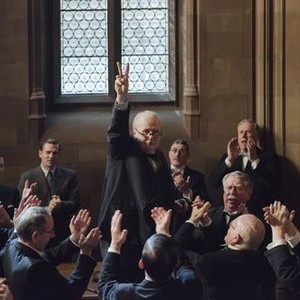Rating: M
Director: Joe Wright
Cast: Gary Oldman, Ben Mendelsohn, Kristin Scott Thomas, Lily James, Stephen Dillane, Ronald Pickup
Distributor: Universal
Released: January 11, 2018
Running Time: 125 minutes
Reviewed by Travis Johnson
[rating: 4.5/5]
At the dawn of World War II the British Parliament is a shambles as Neville Chamberlain (Ronald Pickup), his policy of appeasement towards Hitler a failure, is ousted from the office of Prime Minister. Into his place steps Winston Churchill (Gary Oldman), a cantankerous and controversial figure viewed as a weak wartime leader thanks to the failure of the Dardanelles Campaign he masterminded in World War One. With the British Expeditionary Force facing annihilation on the European mainland (see: Dunkirk) and Chamberlain and his political allies advocating for peace negotiations, the dogged Churchill must rally his friends, placate or pulverize his opponents, and become the unifying leader wartime Britain needs.
The only reason we wouldn’t call this a career-best turn from Oldman is that he’s given so many fine performances over the years that measuring the gradient at the far edge is a dicey proposition. Let’s call it top five, then, and easily his best since 2011’s Tinker Tailor Soldier Spy. Not the physical match that Brian Cox was when he played Churchill earlier this year in Jonathan Teplitzky’s eponymously titled film, Oldman burrows into a fiction suit of fake fat, wrinkles, pouches, prosthetics and more, and yet still manages to deliver up a performance that is at once human, iconic, and yet bereft of caricature. It’s remarkable work.
As is the film he’s embedded in. The third in 2017’s oddly timed Blitz Triptych (along with the aforementioned Dunkirk and Churchill), Darkest Hour might be the best yet. It’s clearly a leap ahead of the latter, which was essentially a mediocre film wrapped around a great actor, and while it lacks the sheer technical brio of Dunkirk, it’s a more complete dramatic experience; it breathes, it ponders, it ramps up slowly and preferences drama over thrills (as great as Dunkirk is, one feels that, to paraphrase Daffy Duck, you can only do it once).
It is, unsurprisingly, an incredibly handsome film, taking place in a deeply textured, antique world of burnished dark wood, polished brass, and indirect light, crossing between the leather-furnished drawing rooms where cunning strategies are designed and the vaulting architecture of the seats of government where the fruits of those plans are made public. In many ways it’s an old-fashioned film in its construction; indeed, the few times when director Joe Wright (Atonement, Pan) breaks with the usual subdued camera aesthetic – once when tracking a bomb down from a plane ala Michael Bay’s Pearl Harbor, another pulling up from Churchill in rooftop reverie until we see London arrayed around him – rather shatter the immersion, they’re so jarring.
Darkest Hour doesn’t need that kind of flamboyance. This is a film predicated on dialogue and performance, and in those areas it delivers completely. Casting everyone’s favourite multi-decade overnight success, Ben Mendelsohn, as George VI, turns out to be a masterstroke, with the Australian actor imbuing the much-performed King with a mix of privilege, strength and vulnerability that sets this George well apart from previous portrayals. Meanwhile, Kristin Scott Thomas, while perhaps not given as much to do as Miranda Richardson in Churchill, excels as Clementine, Winston’s wife, staunchest supporter and, when needed, most cutting critic.
Of course, what we’re really here for is to hear Oldman, unarguably one of the great actors of his age, sink his teeth into a famous speech or two, and in this Darkest Hour he absolutely delivers. It’s one thing to give us insight into Churchill’s private, more vulnerable moments, but such a bombastic and theatrical figure really lives on the screen when the actor playing him is given full license to be bombastic and theatrical – the actor playing the character who is playing the part of the great orator, in effect. In doing so Darkest Hour manages to reconcile the man and the myth, and while it occasionally succumbs to hagiographic tendencies, it remains a stirring yet thoughtful portrait.
This review is courtesy of our friends at Australia’s foremost film site www.filmink.com.au




